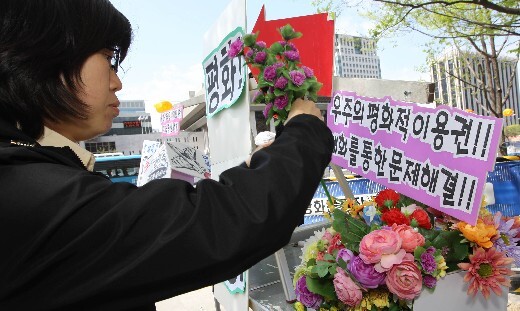hankyoreh
Links to other country sites 다른 나라 사이트 링크
S. Korea announces full participation in PSI

The South Korean government decided yesterday to become a full participant in the U.S.-led Proliferation Security Initiative (PSI) on weapons of mass destruction, potentially raising the level of the already-heightened tensions on the Korean peninsula. Some worry that the move is a “dangerous” decision that could lead to a military clash between South and North Korea.
The Seoul government thinks that it is unlikely that the move will prompt North Korea to take any significant countermeasure. It thinks that chances are slim that Pyongyang will scrap an inter-Korean maritime agreement in retaliation to South Korea‘s decision to join in the anti-proliferation drive. “The maritime agreement mostly affects shipments of aid bound for North Korea rather than shipments bound for South Korea,” said an official at the Ministry of Foreign Affairs and Trade. “It is questionable that North Korea will scrap the deal since the decision would lead to an increase in shipping time and fuel consumption as its vessels cannot pass through the Jeju Strait.”
Many critics, however, say that the government is too complacent and has not analyzed the short and long-term ramifications of its PSI decision. They argue, in the short term, North Korea is very likely to raise the level of tensions in response to Seoul’s move to fully participate in the initiative. On March 30, North Korea stated that they would consider the act of South Korea joining fully PSI as an “ultimatum,” vowing to take “stern” countermeasures.
Observers suggest that a possible disconnection or restriction in communication, a test launching of a short-term missile or stepped-up military operations near the Northern Limit Line might be among those measures. The Korea Institute for Defense Analyses warned in a report in December 2006 that North Korea is likely to heighten tensions by mobilizing its military forces and causing provocations to discourage South Korea from joining PSI.
In the long term, chances will likely grow that a military clash or some diplomatic friction with China could take place. Under PSI, South Korean military and maritime police could intercept, challenge, warn, board, or seize North Korean ships suspected of carrying shipments related with weapons of mass destruction. If North Korea resists or mobilizes its military forces, a clash would be inevitable. Jung Young-cheol, professor of Sogang University, said, “Full participation in PSI is equivalent to an official announcement of a confrontational stance against North Korea. North Korea will likely take countermeasures saying that it will be impossible to normalize inter-Korean relations or that a war would be unavoidable.”
Please direct questions or comments to [englishhani@hani.co.kr]
Editorial・opinion
![[Column] Park Geun-hye déjà vu in Yoon Suk-yeol [Column] Park Geun-hye déjà vu in Yoon Suk-yeol](https://flexible.img.hani.co.kr/flexible/normal/500/300/imgdb/original/2024/0424/651713945113788.jpg) [Column] Park Geun-hye déjà vu in Yoon Suk-yeol
[Column] Park Geun-hye déjà vu in Yoon Suk-yeol![[Editorial] New weight of N. Korea’s nuclear threats makes dialogue all the more urgent [Editorial] New weight of N. Korea’s nuclear threats makes dialogue all the more urgent](https://flexible.img.hani.co.kr/flexible/normal/500/300/imgdb/original/2024/0424/7317139454662664.jpg) [Editorial] New weight of N. Korea’s nuclear threats makes dialogue all the more urgent
[Editorial] New weight of N. Korea’s nuclear threats makes dialogue all the more urgent- [Guest essay] The real reason Korea’s new right wants to dub Rhee a founding father
- [Column] ‘Choson’: Is it time we start referring to N. Korea in its own terms?
- [Editorial] Japan’s rewriting of history with Korea has gone too far
- [Column] The president’s questionable capacity for dialogue
- [Column] Are chaebol firms just pizza pies for families to divvy up as they please?
- [Column] Has Korea, too, crossed the Rubicon on China?
- [Correspondent’s column] In Japan’s alliance with US, echoes of its past alliances with UK
- [Editorial] Does Yoon think the Korean public is wrong?
Most viewed articles
- 1‘We must say no’: Seoul defense chief on Korean, USFK involvement in hypothetical Taiwan crisis
- 2N. Korean delegation’s trip to Iran shows how Pyongyang is leveraging ties with Moscow
- 3‘Weddingflation’ breaks the bank for Korean couples-to-be
- 4Will NewJeans end up collateral damage in internal feud at K-pop juggernaut Hybe?
- 546% of cases of violence against women in Korea perpetrated by intimate partner, study finds
- 6[Column] Park Geun-hye déjà vu in Yoon Suk-yeol
- 7“Parental care contracts” increasingly common in South Korea
- 8[Column] Yoon’s first 100 days should open our eyes to pitfalls of presidential system
- 9[Interview] Dear Korean men, It’s OK to admit you’re not always strong
- 10[Editorial] New weight of N. Korea’s nuclear threats makes dialogue all the more urgent